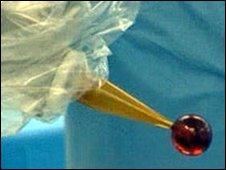One-shot radiotherapy 'success against breast cancer'
- Published

The probe is inserted into the breast during intraoperative radiotherapy
A single dose of radiation during surgery is just as effective as a prolonged course of radiotherapy for breast cancer, a study suggests.
Doctors have tested the technique, which involves a single shot of radiotherapy to a tumour site, in more than 2,000 patients.
It could save the UK ТЃ15m a year, the researchers said.
Cancer Research UK said The Lancet study could have a "huge impact" for patients.
The researchers said using the one-stop procedure would be more convenient for patients and cut waiting lists.
Treatment to surgically remove cancerous breast tissue is the starting point of treatment for thousands of women in Britain each year.
That is often followed up with weeks of radiotherapy to the whole breast to kill any remaining cancer cells.
But with the new technique, doctors use a mobile radiotherapy machine that can be inserted into the breast to target the exact site of the cancer.
Led by a UK team, but carried out in nine countries, the four-year trial in women over 45 showed similar rates of disease recurrence regardless of the treatment used.
There were six cases of the disease returning in those who had the new single-dose technique and five cases in those undergoing a prolonged course of radiotherapy.
But the single dose during surgery avoids potential damage to organs such as the heart, lung, and oesophagus, which can occur during radiation to the whole breast, the researchers said.
Josephine Ford was treated using the radiation procedure
The frequency of any complications and major toxic effects was similar in the two groups.
University College London Hospitals (UCLH) oncologist Prof Jeffrey Tobias, who enrolled the first patient on the trial at the former Middlesex Hospital in London with oncologist Jayant Vaidya, said: "I think the reason why it works so well is because of the precision of the treatment. It eradicates the very highest risk area - the part of the breast from which the tumour was removed."
Meanwhile, Mr Vaidya, who is also a UCLH oncologist, said the new treatment "could mean that many more women could conserve their breasts".
Josephine Ford, 80, was diagnosed with breast cancer in February 2008 and was successfully treated with this form of treatment three months later.
She said this approach "simplified everything and made the process less traumatic".
And she added that it made her life "so much easier" since she "didn't have to come back to the radiotherapy department on a daily basis for five or six weeks".
'Exciting prospect'
While optimistic about the results, the researchers stressed the findings were only applicable to women with a similar type of breast cancer as those in the trial.
But they added: "Treatment of patients with breast cancer accounts for about a third of the workload of radiotherapy departments in some parts of the world and contributes substantially to the unacceptable waiting lists seen in many oncology departments worldwide.
"In countries such as the UK where the waiting list for postoperative radiotherapy could rapidly diminish with use of targeted intraoperative radiotherapy, we estimate savings of around ТЃ15m a year."
Kate Law, director of clinical research at Cancer Research UK, said: "Radiotherapy is already a very effective treatment, so improving that even further is an exciting prospect.
"Further follow-up of these women will be needed to confirm whether this strategy not only makes the most of the therapy's power but also minimises any long-term side effects."